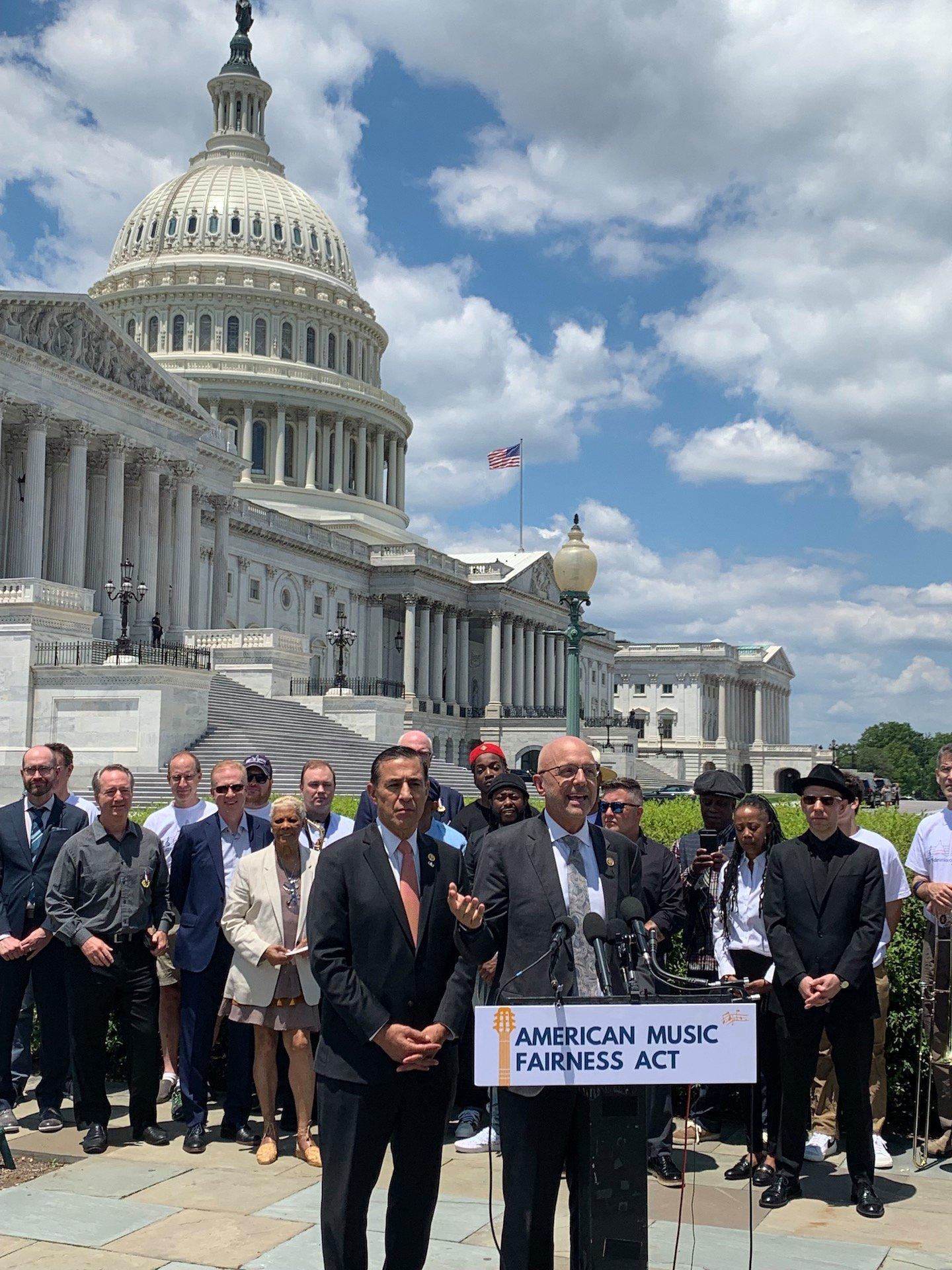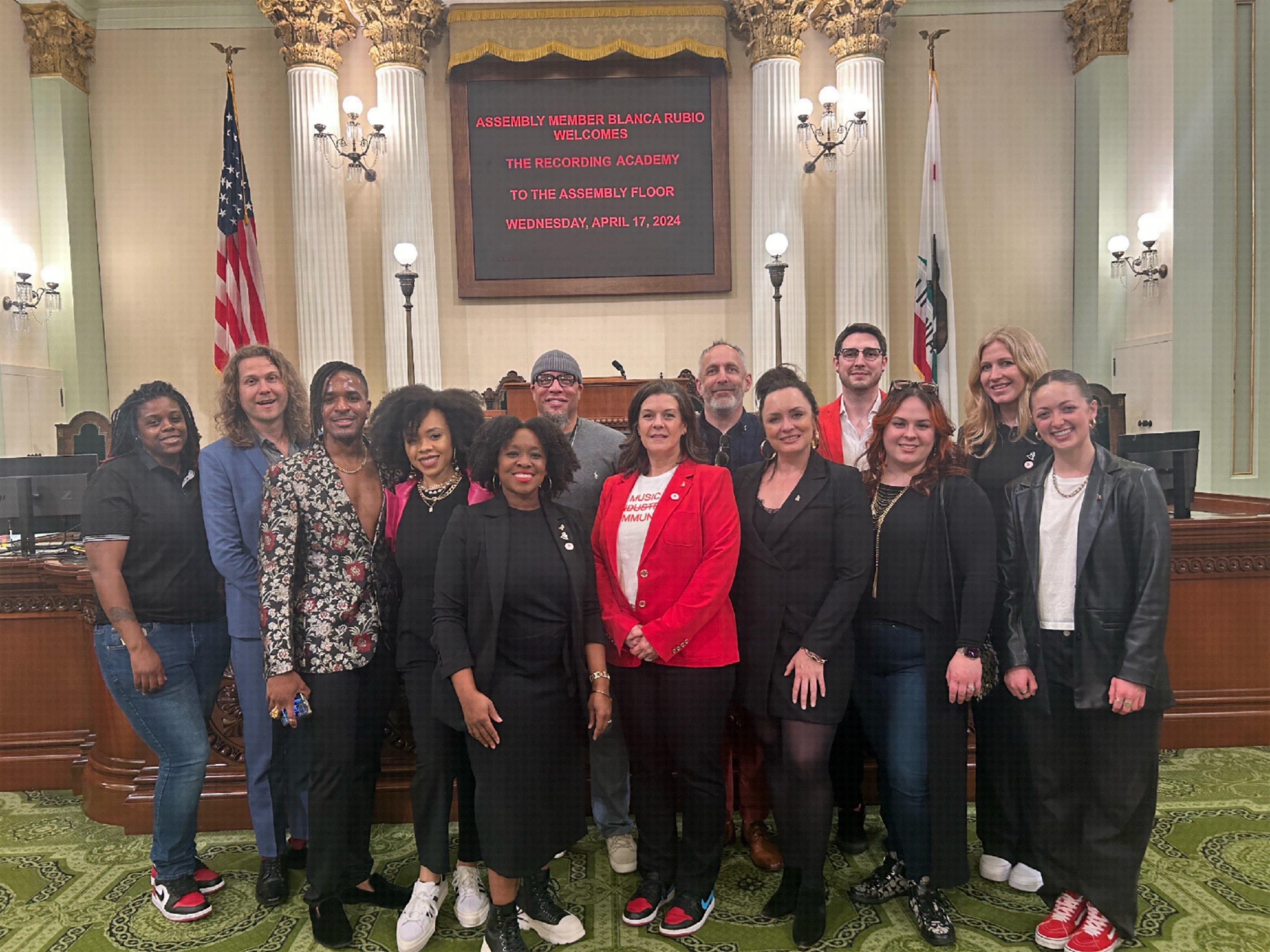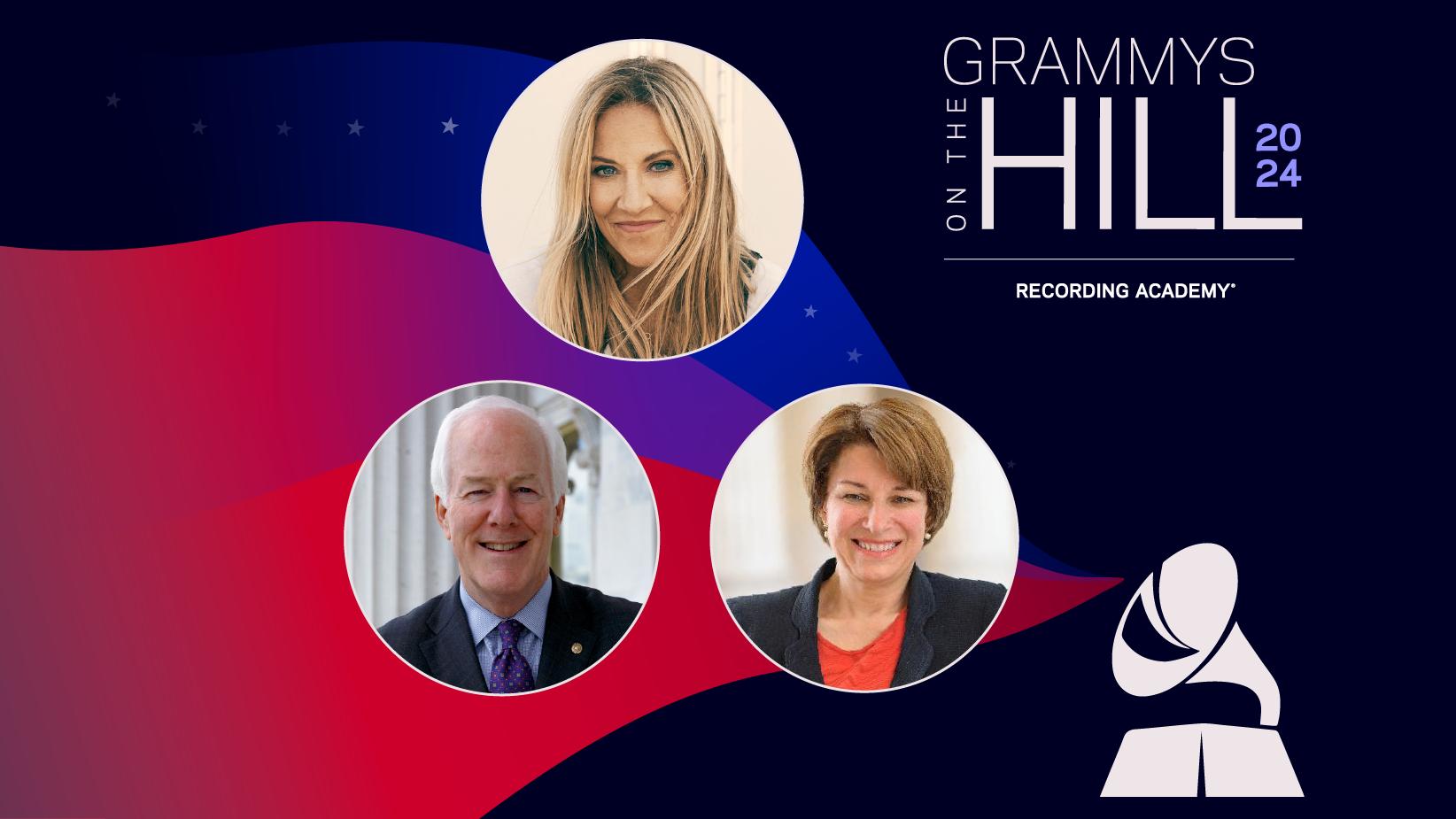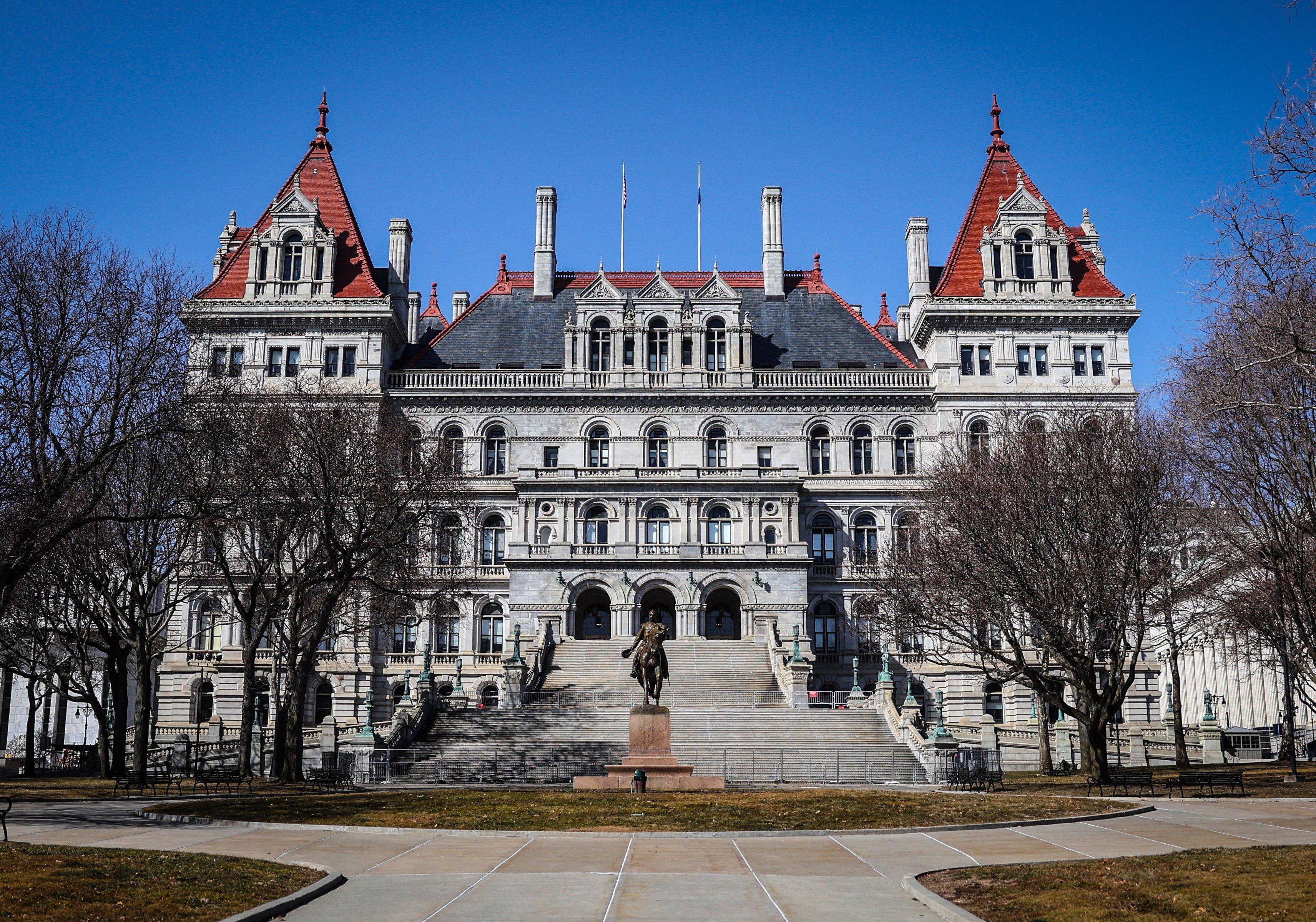Photo: Michael Lewan

(C) Rep. Ted Deutch (D-Fla.) speaking at the U.S. Capitol and (L) Rep. Darrell Issa (R-Calif.)
news
Why The American Music Fairness Act Will Give Music Creators What They Deserve
Bipartisan group of U.S. representatives have introduced the American Music Fairness Act, which will ensure artists are fairly compensated when their songs are played on terrestrial radio stations
On Thursday, June 24, U.S. Representatives Ted Deutch (D-FL) and Darrell Issa (R-CA) introduced the American Music Fairness Act, a new bill to ensure that artists, performers, producers, and music creators are fairly compensated when their songs are played on terrestrial radio stations.
"We commend this bipartisan bill led by Reps. Deutch and Issa, and we thank them for joining us in the fight for fair pay," said Harvey Mason Jr., CEO of the Recording Academy®. "Artists create music that can bring us together and heal us, and they deserve to be paid when their work is played on FM/AM radio."
Currently, and historically, terrestrial (AM/FM) radio stations do not pay artists for the music they play on the radio in the United States. This is because of an antiquated loophole in copyright law that allows AM/FM radio stations to play music while rightly compensating the songwriter, but not also the artists who perform the songs or the studio professional behind the sound recording. The AMFA also includes protections for songwriters to ensure the new right does not encroach on songwriter royalties.
In 2019, music broadcasters made over $10 billion by selling ad revenue, yet did not pay artists for the product – the music – that generates this revenue. The American Music Fairness Act rights this wrong by requiring major radio stations to fairly compensate all artists for their property.
The American Music Fairness Act also works to ensure that AM/FM stations are no longer the only music platforms that do not compensate artists for their music. It is long overdue for terrestrial radio stations to pay royalties to artists just like streaming services, satellite radio, online radio, and every other platform that profits off copyrighted content. The American Music Fairness Act would establish fair market value for radio performance royalties similar to how the law currently works for other music platforms.
Additionally, the American Music Fairness Act will protect small, local broadcasters with dedicated protections and exemptions. Recognizing that consolidation in the radio industry and the COVID-19 pandemic have impacted small and local radio stations that provide invaluable services to our communities, Reps. Deutch and Issa worked to ensure that truly small and local radio stations are treated differently than Big Radio conglomerates.
Under the American Music Fairness Act, radio stations that fall under $1.5 million in annual revenue and whose parent companies fall under less than $10 million in annual revenue overall would be exempt and pay a special rate of less than $2 per day ($500 annually) to play unlimited music. Other exemptions under the bill would apply to public, college and other noncommercial stations as well as super-small stations in general, who would pay as little as $10 per year.
Finally, the American Music Fairness Act supports American artists whose music is popular in other countries with a performance right. The AM/FM radio loophole currently harms American artists when foreign radio stations play their music overseas. Foreign countries routinely hold royalties that should go to US artists due to the lack of American terrestrial performance copyright.
Moreover, the US is one of the only countries that do not require a performance copyright for terrestrial radio. That means there are hundreds of millions of U.S. dollars, owed to American artists, being left on the table around the world. The American Music Fairness Act would ensure that foreign countries pay US artists when their songs are played overseas.
In conclusion, fairness and equity are bedrock American principles. As the country recovers from a year and a half of tremendous personal loss and economic suffering, it is vital that Congress protect the livelihoods of those who create the music we know and love.
Congress: It's Time To Side With Music Creators Over Big Radio

Photo: Vanessa Eliasson
news
Academy Members Advance The Fight For Artists' Rights in State Capitals Across the Country
Recording Academy members from the Chicago, Los Angeles, and San Francisco Chapters convened with state legislators to address pressing concerns, including the misuse of individuals' likenesses in the age of generative artificial intelligence.
Last week, spanning from Springfield to Sacramento, the Recording Academy continued to empower artists and creators through impactful state Advocacy Days. These Advocacy Days highlighted the Academy's unwavering commitment to championing legislative measures that protect and favor artists in the ever-evolving digital landscape.
In Springfield, Illinois, Recording Academy members from the Chicago Chapter convened with members of the Illinois General Assembly to address pressing concerns surrounding the misuse of individuals likeness in the age of generative artificial intelligence.
Central to the discussion was the proposed legislation, HB 4875/SB 3325, which aims to modernize Illinois's Right of Publicity law to specifically address the challenges artists face from AI-generated creations. Since the legislation's introduction the Recording Academy has been a staunch advocate for HB 4875/SB 3325 and how it establishes key safeguards and enforcement mechanisms to ensure an individual's identity is not misappropriated.
Just 24 hours after Advocacy Day in Illinois, the legislation swiftly passed the House by a vote of 79-24 and is now headed to the Senate. Should it be enacted into law, Illinois would become the second state in the nation to proactively protect creators from having their likeness misused by generative AI, setting a vital precedent for other states and the federal government to follow suit. The Recording Academy's advocacy efforts in Springfield reflect a broader commitment to fostering an environment where artists can thrive without fear of exploitation or infringement.
Meanwhile, across the country in Sacramento, California, Recording Academy members from the San Francisco and Los Angeles Chapters joined California for the Arts for its annual Arts Advocacy Day, amplifying their voices in support of legislation that empowers creators and protects their interests. In addition to advocating for robust support for the arts and arts-related funding, among the bills discussed were AB2602 and AB1836, which tackle critical issues ranging from informed consent regarding the use of digital likeness to posthumous protections for deceased individuals.
AB2602 represents a significant step forward in empowering creators by granting them greater control over their digital identity. By requiring informed consent in contracts or negotiations involving digital likeness, the bill promotes transparency and fairness, ensuring that creators retain agency over how their likeness is represented and utilized.
Similarly, AB1836 addresses a glaring gap in California's current Right of Publicity law by extending protections to include deceased creators. In an era dominated by AI-generated replicas, safeguarding individuals' likeness from unauthorized use, even after death, is paramount to preserving their legacy and protecting their families' interests.
As Recording Academy members continue to advocate tirelessly on behalf of artists nationwide, these advocacy days serve as a reminder of the Academy's pivotal role in shaping legislation that fosters a more equitable and supportive environment for creators. By working with creators and amplifying their collective voice, the Academy is effecting meaningful change and paving the way for a brighter future for the music community.
The New York State Senate Passes Bill to Protect Creative Expression: Here's What You Need To Know

Photos (L-R): U.S. Senate Photographic Studio; Victoria Will; U.S. Senate Photographic Studio - Frank Fey
news
GRAMMYs On The Hill Awards 2024 Honorees Announced: Sheryl Crow, Sens. John Cornyn & Amy Klobuchar
The annual event hosted by the Recording Academy in Washington D.C., will celebrate music and advocacy by bringing together congressional leaders and artists to honor those who champion creators' rights.
On Tuesday, April 30, the Recording Academy will host its annual GRAMMYs on the Hill Awards, Washington's premier annual celebration of music and advocacy, bringing together congressional leaders and music makers to recognize those who have led the fight for creators' rights.
Sponsored by City National Bank and benefitting the GRAMMY Museum, this year's awards will honor nine-time GRAMMY winner Sheryl Crow and Senators John Cornyn (R-TX) and Amy Klobuchar (D-MN) for their contributions to support music creators. Hosted by singer and actress Candiace Dillard Bassett, the awards dinner will be held at the Hamilton Live in Washington, D.C., and will feature live performances and special guests.
"Protecting the rights of creators lies at the core of the Recording Academy's mission," said Harvey Mason jr., CEO of the Recording Academy. "GRAMMYs on the Hill is an opportunity to celebrate the artists and our nation's leaders who champion this cause, and to acknowledge music's unifying power. We're grateful to Sheryl and Sens. Cornyn and Klobuchar for their tireless efforts in safeguarding the music community and are thrilled to be recognizing them later this month in our nation's capital."
"Receiving this award from the Recording Academy is a tremendous honor for me, because protecting the rights of creators is more important now than ever before,” said Crow. “In this age where technology is changing the world faster than we can adapt, we need clear eyes to see both the opportunities and the challenges ahead, so that artists are not disadvantaged any more than they already are. Music nourishes our humanity, and I am proud to be recognized as an advocate for the protection of the people who make it."
"As a Texan, a love of live music is in my blood, and I've been proud to lead the charge on legislation that helps artists, entertainers, and venues meet the needs of their fans, including the Save Our Stages Act and the Fans First Act," said Sen. Cornyn. "I want to thank the Recording Academy for honoring me, and I look forward to continue to work on behalf of performers and fans across Texas and the nation."
"It's an honor to be recognized by the Recording Academy, an organization that uplifts performers, songwriters, and other music professionals in our country," said Sen. Klobuchar. "Music has the power to bring us together and it is something we can never take for granted. That’s why I fought to pass the bipartisan Save Our Stages Act with Senator Cornyn to ensure independent arts venues survived the pandemic, and why we are working together to improve the ticketing experience with the Fans First Act. There's nothing like live music and concerts, and I remain committed to ensuring artists can continue to share their music with the fans who love it."
Crow has dedicated much of her life to activism, supporting policies and philanthropic endeavors close to her heart. In 2000, she co-founded the Recording Artists' Coalition with previous GRAMMYs on the Hill honoree Don Henley to protect creators' rights and change unfair industry practices. Her advocacy for artists and songwriters continued through congressional testimony, editorials, artist petitions, and more. In 2009, the Recording Artists' Coalition formed an alliance with the Recording Academy to continue its mission as a program within the Academy's Advocacy office. Recently, she has been vocal about the threat that AI presents to music creators, including on her new song "Evolution," which grapples with the future impact of artificial intelligence on humanity and the planet. As a philanthropist, Crow is known for her passionate support of multiple charities, including MusiCares, The Breast Cancer Research Foundation, The World Food Program, Feeding America, ADOPT A CLASSROOM, the Elton John AIDS Foundation, Pelotonia, the Delta Children's Home and many other worthy causes.
Read more: How The Recording Academy Is Redoubling Its Efforts To Protect Creators From AI Risks
Crow is a nine-time GRAMMY winner and was inducted into the Rock and Roll Hall of Fame in 2023. Her first nine studio albums have sold 35 million copies worldwide; seven charted in the Top 10, and five were certified for multi-platinum sales. Her songs defined the third wave of feminism, a rocker's ability to sweep the pop charts without losing any edge and enough wide-open Midwestern joy to captivate the world.
Cornyn and Klobuchar are the congressional honorees being recognized for their stalwart support of creators and their collaborative efforts championing key policies in support of the music community. During the COVID-19 pandemic, Sens. Cornyn and Klobuchar provided a critical lifeline for music through the Save Our Stages Act, which provided $16 billion in federal assistance to shuttered venues and represents the largest federal investment in the arts in U.S. history. In this Congress, they are working to reform live event ticketing through the Fans First Act. Introduced in December 2023, the legislation would address flaws in the ticketing marketplace by increasing transparency, protecting consumers from deceptive practices, and holding bad actors accountable.
The day after the event, on May 1, the Recording Academy will host the annual GRAMMYs on the Hill Advocacy Day, which brings current and past GRAMMY winners and nominees, along with other esteemed industry leaders, to meet with lawmakers to discuss issues facing today's music creators. The day is recognized as Capitol Hill's largest and most prestigious legislative event for music. This year, music creators will convene with members of Congress to advance key issues that the Academy and its members continue to advocate for, including:
Protecting the image, likeness and voice of individual creators from AI fakes through legislative measures such as the No AI FRAUD Act and the No FAKES Act discussion draft.
Reforming the live event ticket marketplace to better protect artists and fans through legislation including the Fans First Act and the TICKET Act.
For the first time in 2024, GRAMMYs on the Hill will expand beyond the traditional two-day event to reflect Music's Biggest Week in Washington. On May 3, the GRAMMYs on the Hill Future Forum will be held in partnership with the Human Artistry Campaign, and will explore the impact of artificial intelligence on the music community.
Since its inception, GRAMMYs on the Hill has hosted award-winning artists and applauded congressional leaders alike, including 13-time GRAMMY winner Pharrell Williams, then-Vice President Joe Biden, two-time GRAMMY winner Garth Brooks, former United States Secretary of State and Sen. Hillary Rodham Clinton (D-NY), four-time GRAMMY winner Missy Elliott, former Sen. Orrin Hatch (R-UT), 28-time GRAMMY winner Quincy Jones, seven-time GRAMMY winner John Mayer, former Speakers of the House Nancy Pelosi (D-CA) and Kevin McCarthy (R-CA), 16-time GRAMMY Winner Alicia Keys, U.S. Senate Majority Leader Chuck Schumer (D-NY), and more. The annual advocacy event has also led to several major legislative wins for the music industry, most notably the Music Modernization Act.
Ticketing Reforms Make A Big Leap In Maryland: Here's What You Need To Know

Photo: Aaron Foster via Getty Images
news
Ticketing Reforms Make A Big Leap In Maryland: Here's What You Need To Know
This legislation introduces a series of pivotal measures aimed at safeguarding consumers and enhancing transparency in the ticketing industry.
The Recording Academy celebrated last week the advancement of improved ticketing reforms as Maryland achieves a groundbreaking milestone with the passage of SB 539. This legislative triumph not only means a new era of consumer and artist protections for live event tickets, but also positions Maryland as a national leader in holding ticket resellers accountable for fraudulent and deceptive practices hosted on their platforms.
"While fans suffer because of this broken system, so do artists" declares a collective statement of support from the Fix the Tix Coalition, which includes the Recording Academy as a founding member. "Predatory resellers view tickets as nothing more than commodities to be traded for outrageous sums, throwing away the cultural and communal value they provide for our society. They exist to undermine the hard work, talent, and livelihoods of artists, inserting themselves as unnecessary and unwanted middlemen who make their money off the backs of the artists and venues who partner to make these events happen."
This legislation introduces a series of pivotal measures aimed at safeguarding consumers and enhancing transparency in the ticketing industry. First, the bill prohibits deceptive practices such as the selling of speculative or counterfeit ticket sales, shielding concertgoers from exploitative practices used by some ticket brokers and resellers. Second, online ticket resale platforms will face increased accountability under Maryland's Consumer Protection Act.
Additionally, transparent pricing practices will be enforced throughout the ticket purchasing process, ensuring consumers have clear and accurate information. Most notably, this includes standards that ensure a breakdown of the face value price, and any fees, is made clear to the consumer throughout the purchase.
"We're getting used to paying these exorbitant prices. It's funny, now if you get a ticket for face value, that's apparently a big deal," stated Delegate C.T. Wilson, who introduced the legislation in Maryland's House. "That shouldn't be a big deal. We've been tricked into accepting this."
The enforcement of SB 539 seeks to dismantle predatory practices that have long plagued the ticketing industry. From the moment a show is announced, genuine fans are confronted with the uphill battle against scalpers and resellers, who exploit loopholes and employ deceptive tactics to profit at the expense of both fans and artists.
"Legislation like SB 539 is vital to protecting fans, preserving equitable access to entertainment, and restoring balance to the currently broken ticketing ecosystem," the collective statement emphasizes. By removing the profit motive from these practices, such as using illegal bots and price gouging, Maryland's bold legislative actions sets a precedent for other states to follow suit in protecting consumer rights and ensuring a better concert experience for fans and artists alike.
The Recording Academy was one of the many stakeholders who actively worked to pass the legislation and will continue to work towards equitable ticketing practices across the country. There is a collective aspiration that the passage of this legislation in Maryland will serve as a catalyst for change at both the local and federal level.
The Academy remains a staunch advocate for ticketing reform, ensuring that every fan can enjoy the magic of live entertainment without fear of deception or exploitation.
The New York State Senate Passes Bill to Protect Creative Expression: Here's What You Need To Know

Photo: Thomas A. Ferrara/Newsday RM via Getty Images
news
The New York State Senate Passes Bill to Protect Creative Expression: Here’s What You Need To Know
Led by Senators Hoylman-Sigal and Bailey, the senate passage of S. 1738 continues the forward momentum for creative expression in New York, signaling the state senate’s commitment to upholding free speech.
In a significant stride towards protecting musicians' creative expression, the New York State Senate passed S. 1738 on March 27. This bill is aimed at safeguarding the free speech of artists, a fundamental part of making music. The Recording Academy has been a staunch advocate of S. 1738, working to advance the legislation in the last two legislative sessions of 2022 and 2023.
Led by Senators Hoylman-Sigal and Bailey, the senate passage of S. 1738 continues the forward momentum for free expression in New York, signaling the state senate’s commitment to upholding the fundamental rights of creators to express themselves through their art. The legislation stipulates that a defendant's artistic works, such as song lyrics, cannot be used as evidence against them in a criminal trial unless it can be proven beyond reasonable doubt that these expressions are admissible.
Researchers have identified nearly 700 cases where lyrics have been used as evidence against hip hop artists, including several dozen in New York. Protecting the First Amendment rights of New York artists is critical to prevent a chilling effect on the state’s music community that plays a vital role in the economic landscape of New York. The music industry in New York contributes close to $20 billion to the state's GDP annually, supporting over 200,000 jobs. From iconic recording studios in New York City to vibrant music scenes in upstate cities like Albany and Buffalo, the state's diverse music community contributes to its reputation as a global hub for creativity and innovation. New York attracts millions of visitors each year to experience live performances, music festivals, and other events throughout the state.
The Recording Academy's support for this legislation in New York is part of a broader effort to champion similar legislation across the country at the state level. In California and Louisiana, the Recording Academy played a pivotal role in passing new laws that solidified the protection of creators' free speech rights. Additionally, in Maryland, Missouri, and Georgia, the Academy has been advancing similar legislation. A recent Advocacy Day in Annapolis, supporting the PACE Act, allowed Recording Academy members from Maryland to meet with legislators and urge them to protect creative and artistic expression.
At the federal level, the Recording Academy has been advocating for the Restoring Artistic Protection Act, also known as the RAP Act since its introduction. Just like at the local level, this legislation aims to protect the First Amendment rights of artists nationwide. Recording Academy CEO, Harvey Mason jr., and Chair of the Recording Academy's Black Music Collective, Rico Love, released a statement during the introduction of the RAP Act in 2022:
"Today's introduction of the RAP Act in the House of Representatives is a crucial step forward in the ongoing battle to stop the weaponization of creative expression as a prosecution tactic," they stated, “ and we will continue to work…to advance the protections in this bill that ensure all artists can create freely without fear of their work being criminalized."
Now, with the successful passage of S. 1738 in the New York State Senate the Recording Academy will continue to work with Academy members to help advocate for this necessary legislation, including bringing Academy members to Albany next month to advocate for the bill’s passage through the state assembly. Ultimately, the goal is to see S. 1738 signed into law, providing much-needed protections for musicians and affirming New York's commitment to upholding the principles of free speech and artistic expression.
As the legislative journey continues, Recording Academy advocates will continue to advance this critical piece of legislation and ensure that the voices of musicians are valued and protected in the state of New York.
A Victory In Tennessee: Governor Bill Lee Signs The ELVIS Act Into Law
